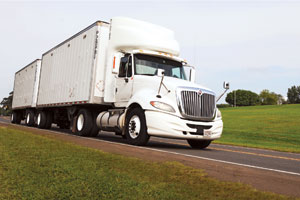FHWA Issues Size, Weight Study; Cites Significant Data Shortfalls

This story appears in the June 15 print edition of Transport Topics.
The Federal Highway Administration announced last week that it does not plan to conduct additional research on the safety effects of larger or heavier trucks.
That announcement came days after the agency issued a congressionally mandated study on size and weight that was filled with mentions of data shortfalls and unknowns, making the report seemingly useless.
In fact, Peter Rogoff, undersecretary at the U.S. Department of Transportation, told congressional leaders that data collected were so limited that DOT could not recommend any changes to current federal policy.
Rogoff said the research “revealed very significant data limitations that severely hampered FHWA’s efforts to conclusively study the effects of the size and weight of various truck configurations.”
“At this time, the department believes that the current data limitations are so profound that the results cannot accurately be extrapolated to predict national impacts,” Rogoff wrote.
Last week, FHWA spokeswoman Nancy Singer said the research phase of the study is complete.
“Our final report to Congress will provide an overview of the public and peer review input in addition to the findings of the study and identify potential areas for further research, which may not solely be in the realm of federal responsibility,” Singer told Transport Topics.
The report had aimed to address the effects on safety, infrastructure and law enforcement that differing vehicle combinations have.
“In some ways, the study yielded more questions than it sought to answer. Another study effort, conducted with more time and more money, would not yield more reliable results,” FHWA said in a statement.
The two-year study looked at six different truck configurations, including twin 33-foot trailers. It was mandated by the 2012 federal transportation law known as MAP-21.
Despite the limitations, the study was able to identify higher crash rates in 6-axle trucks compared with 5-axle trucks in Washington state, but the lack of available and consistently reported data from other states represented a significant limitation.
The study also showed that all truck configurations used in the six configurations studied likely would result in a decline in fuel costs and carbon dioxide and nitrogen oxide emissions.
“Given the timing of the release of this study, it is an obvious attempt to promote administration policy rather than give Congress the unbiased information it requested,” American Trucking Associations President Bill Graves said in a statement. “It is appalling that after years of saying the study would not make recommendations, DOT officials would release this report — and recommend no change in current law — just days after the White House came out opposing truck productivity increases.”
He added: “Our experience as an industry, as seen by the safe and efficient use of twin 33foot trailers in the states of Florida and North Dakota, shows the obvious benefits of this configuration. As flimsy as this report is, it at least acknowledges these more productive combinations will improve efficiency, saving American consumers billions of dollars.”
Joshua Schank, CEO of the Eno Center for Transportation, said the size and weight issue is one that DOT “has no desire to insert itself in.”
“If they rule in favor of heavier trucks, the railroads will be upset with them,” Schank told TT. “If they rule against the truckers, they’ll be upset.”
Schank added, “It’s a policy decision, and DOT doesn’t want to make that decision.”
The Coalition for Transportation Productivity, a nonprofit made up of about 200 shipper and trucker trade organizations, said the study’s 6-axle heavy-truck data “debunks” several major points of opposition to 6-axle truck weight reform.
But it added, “The department’s inability to endorse gross vehicle weight reform without a more robust study is neither surprising nor unexpected, especially given the highly charged atmosphere surrounding this study.”
Rep. Lou Barletta (D-Pa.), who requested the study, called the results “good news” for his constituents.
“This is a tremendous victory for localities in Pennsylvania and elsewhere because it means that larger and heavier trucks won’t be damaging their local roads,” Barletta said in a statement.




